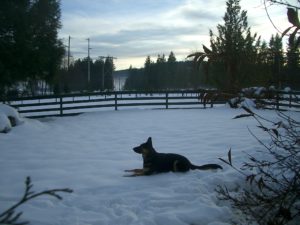You have no items in your cart. Want to get some nice things?
Go shopping
https://goo.gl/fY4KXN
I’m in Deer Isle, Maine – about an hour from my home in Bangor. My shift is almost over. I think about the beers in my fridge and the wood pellets waiting to be thrown in the stove. I think about the cable television that’s just been installed.
Something slams into the front of my delivery truck, and I throw my foot on the brake. My tires slide forward several feet on the icy road before gaining traction. I pause, put the vehicle in park, and depress the emergency break. Through my windshield, I see only white snow and white sky.
“Hey!” a man calls out, running toward the road. He kneels down beside something in front of my truck.
I push open the driver-side door and step down onto the road. The man is crouched over a mass of brown and black fur. Two large ears perk up and then fold back down. The creature, which appears to be a German Shepherd, whimpers again and again. A puddle of blood expands beneath it. Some is absorbed by the snow, and some flows freely on ice.
I keep silent. My hands are shaking. The man regards the dying dog, assessing its condition. He’s careful not to touch it. Eventually, he comes to his feet and turns to me.
“I’m sorry. I shouldn’t have let him off the leash.”
“No. I should’ve been paying closer attention,” I say. “Let me take him to the emergency vet. I’m at the end of my shift.”
He glances at the dog. “Too late for that. Wait here. I’ll be right back.” The man walks back toward his house, leaving me alone with the German Shepherd. I crouch beside it and run my hand through my thinning hair. I’m sweating in spite of the cold. The dog continues to whimper. It trains its eyes on me, but they seem hollow.
The man returns after several minutes carrying a rifle. It’s a Remington – glossy walnut, blued metal. There’s a Fleur-Di-Lis engraved in the stock.
“Please, let me take him to the vet,” I say.
“No.” He gestures for me to step back. I do. He leans over the dog and places the barrel to its head. The dog stops whimpering, and I turn my head away in anticipation. The shot is deafening.
“I’m so sorry,” I say, still looking away.
“He was an old boy. Besides, it’s not your fault.” The man sets the butt of the rifle down in the snow. “What’s your name?”
“I’m James.” I turn toward him and extend my hand.
“Alex Cyr.” He grasps my hand firmly. He’s younger than I’d realized – in his twenties maybe. He’s wearing an oversized Carhartt jacket, carpenter’s jeans, and work boots. His dark hair is cut short. “I hope your truck isn’t damaged.”
“It’s fine.” I say without looking.
“So you work for UPS?”
“Yeah. Thirty years and counting.”
“You look a little white in the face. You should come in. I’ll get you a glass of water, a beer, anything.”
“Thanks.” I laugh a bit. “But I should get home. My daughter’s waiting.”
“A cigarette?”
“Alright. I could use one.” He produces a pack of Newports from his jacket pocket and holds one out to me. I take it and place it in my mouth. He lights mine first and then his own.
“What do you do?” I ask.
“Landscaping in the summer, snow removal in the winter, odd jobs. I just moved out here last year to live with my girlfriend.”
“Deer Isle’s part of my regular route. It’s a good place. Lots of good people here.”
He nods and blows out smoke. “I’m from up north so this feels like the city to me.” We both laugh, and we finish our cigarettes in silence. Snow begins to fall. Large, fluffy flakes cover the dog’s carcass.
I hold out my hand again, preparing to leave. “You’re sure there’s nothing I can do?”
He shakes it. “Nothing, but drive safe. The roads are rough.”
“I will.” I open the door to my truck, which is still running quietly. I pull myself into the seat and then look back at him. “What was his name?”
“Don’t worry about it, alright?”
“Alright.” I try to smile at him.
*
I drive home slowly. It takes nearly two hours to get back to Bangor, and it’s dark when I pull into the driveway. The smell of the pellet stove hits me as I open the door. I walk to the fridge, take a tall Pabst, and crack it open.
“You’re home late.” My daughter strolls out of the den into the kitchen. Her hair is put up in a messy bun. She’s wearing sweatpants, a loose t-shirt, and a smirk on her face.
“Long day,” I say.
“Yeah?”
“Yeah. I hit someone’s dog up around Deer Isle. It was a German Shepherd.”
“Shit.” She looks down at the ground. “How did it happen?”
“The owner let him off his leash. He must have darted out. I didn’t even see him coming.”
“Did he survive?”
“Barely. Then the owner went back into his house, took a hunting rifle and put him out of his misery.”
“Why wouldn’t you at least try taking him to the vet?” Her eyes are fiery.
I pause and take a long sip of my beer. I think about the dog’s carcass covered in snow. Its hollow eyes were covered, too.
“It was the owner’s choice,” I say. “He was a good man.”
“They’re all a bunch of hicks in this state.” She stomps loudly out of the kitchen. I brace myself on the counter and watch the snowfall through the window.

About Nick Kaye
Nick Kaye is a writer, an editorial assistant at Chelsea Green Publishing, and a fiction reader for the New England Review. His work includes both fiction and narrative non-fiction dealing with place and identity in rural New England. Nick’s favorite animal is the spectacled bear (Tremarctos ornatus), but he also enjoys imagining bears of all varieties wearing spectacles.





Andy here: Yes. Good. Because,among other virtues,made me feel what the narrator feels, e.g., upset, sad, but not dramatically “destroyed.”
Nothing a beer won’ fix. But PABST?!!
Ohh . . . Nick!